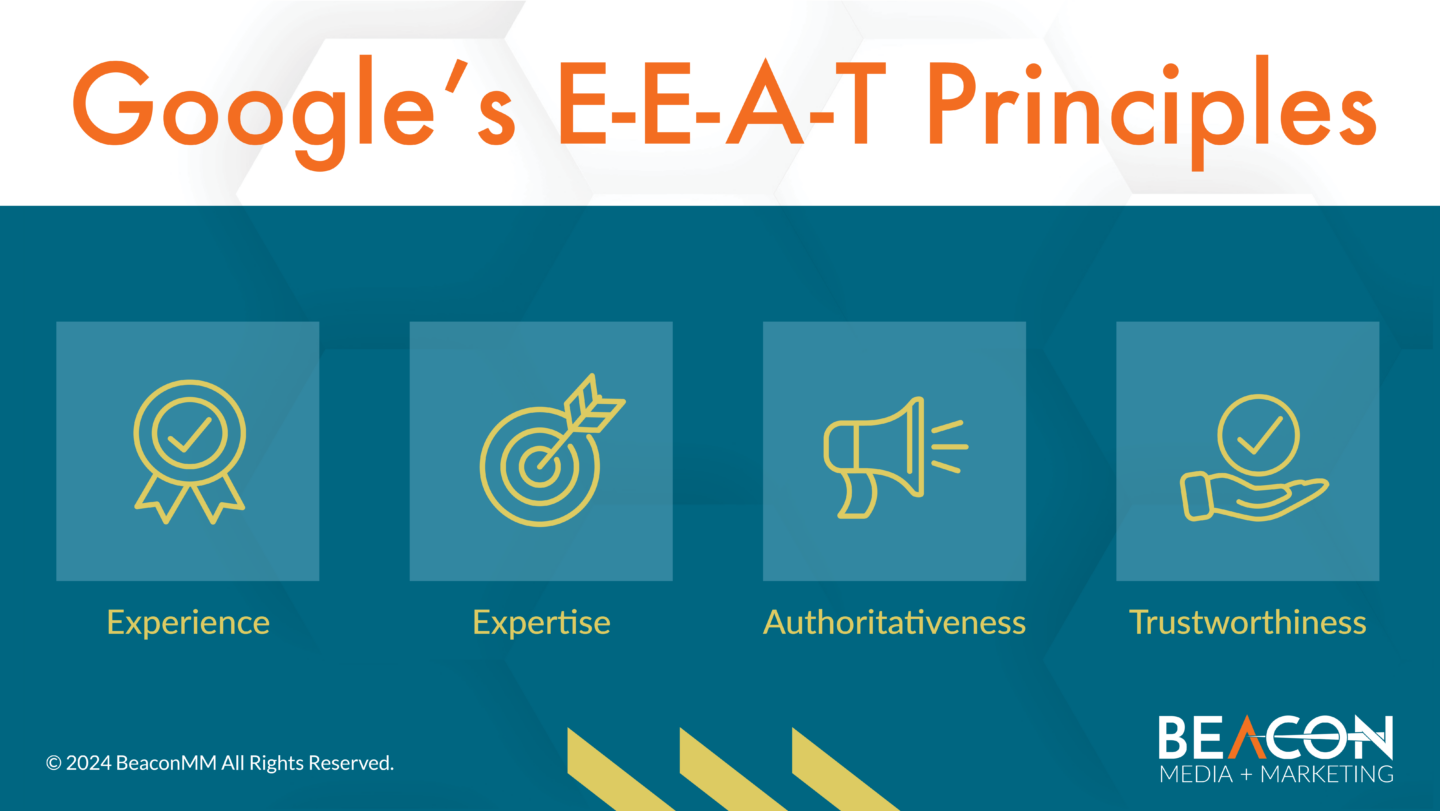When I think about my time in marketing, or with business operations in general, I’ve come across a variety of standards, principles, and values that companies and their employees are expected to adhere to. Some are basic, some are inspiring, and some are even a bit bold. But in the stack of standards and all their many variances, only one thing remains true; if your actions don’t live up to your words, you really have nothing to say.
The Beacon Way is more than just a statement, and it’s more than just our standard — it’s an evolving set of values that we place ahead of our business approach, whether it’s the first time we meet with a client, or when we say goodbye to one. The Beacon Way sets us and our clients apart and places us on a path toward building a relationship, never leading to a generic business arrangement.
As our technology changes and industry standards change, we’ve found that the Beacon Way is also what guides us in adhering to the new standards being established in our industry, especially when we’re talking about Google’s latest core update, EEAT principles, and the ethical practices for using generative AI.
Learn how aligning with Google’s EEAT standards in your marketing can drive you to the top of search results. Reach out today for a free discovery call.
How Do the Beacon Way and Google EEAT Align with Broader Marketing Goals and Target Audience Engagement?
I’m proud to say that Google EEAT principles (experience, expertise, authority, trustworthiness) are actually incorporated into the Beacon Way, and this is part of what we like to consider our “holistic” or integrated marketing practice. Essentially, in our marketing approach, the Beacon Way guides us toward not only adhering to EEAT principles but also in uncovering the root cause of the problem (poor quality marketing) versus simply treating the symptoms (little to no conversions).
For example, one of our most important core values here at Beacon is that we strive to always go deep and make an impact. When we go deep with our clients, we truly understand who they are and their specific needs. We realize it’s our own expertise and experience that allows us to do this. Once we’ve built the foundation for that personal relationship, we can then structure all our clients’ messaging holistically — allowing other people to connect with them on a more personal level.
When we think of Google EEAT, for the quality raters to be appeased, we always want to demonstrate experience, expertise, authoritativeness, and trustworthiness, right? This is why these are also the pillars of the Beacon Way, and why they should be an integral part of your marketing approach.
The Problem With Content Overload

If you look at the content that’s living online today, we’re living in an era of content overload — and much of it is a regurgitation of a regurgitation. Content quality in today’s digital landscape, in one simple word, sucks. This alone is causing people to continue scrolling past content because it’s not offering any value. And frankly, what reason does a person have to land on your content and actually read it if it’s the exact same thing they can find on 100 other websites?
Answer: No reason at all.
At Beacon, both with our own content marketing and for our clients, we’re trying to cut through the noise of content overload, mindless content, duplicate content, etc. And the only way to cut through the noise is to have a very specific niche message that connects to people — one that comes from an authoritative or trustworthy source. Basically, you can’t expect a potential client to connect with a social media post, blog, or newsletter that’s been generalized or repurposed 100 times with little to no strategy, personalization, or dedication behind it.
Really, who would want to?
Information overload and baseline educational content marketing are no longer leading the way. Thus, we’ve moved into developing a more personalized niche connection. This aligns with Google EEAT principles because people are not just searching for specific answers, they’re searching to fulfill a very specific need. And we get it — people today are frustrated when they get generalized “answers” and their needs go unmet.
When it comes to audience engagement, we have to remember, we’re living in the age of intelligence. People are seeking not only authenticity but genuine intellect as well. What we’re doing with our marketing approach not only meets Google’s standards, it makes people think and it meets our clients’ needs, and this is the difference between true intelligence and a bucket of generic information.
Do Google’s Quality Rater Guidelines Ever Require a Nuanced Approach?

In a nutshell, yes. We know that Google’s search quality rater EEAT principles are tiered. For example, trustworthiness is sometimes considered to be at the top, with authority, experience, and expertise acting as its supporting tripod — or the three pillars that lead to trust. But, in certain industries, trust may be more important than authority, and vice-versa for others. It’s our job to know the difference.
For example, in the mental health field, as a potential client, trusting your therapist is likely going to be much more important than the therapist’s educational background for most people.
So the question then becomes, will I pick the therapist with a PhD that I can’t trust, or do I pick the person with lesser experience who’s giving me all the right signals of trust? Personally, I’ll always choose the person I trust.
Just for an illustration, let’s pretend a therapist who has just started a practice has 50 great reviews, their website immediately makes you feel welcome and safe, and you can even see a video of them that shows how much they actually care about people. I’m going to choose the person with a high trust factor, even if they haven’t been practicing as long over the person in business for 20 years with minimal customer service information on their website, or no personal signals of trust.
In that scenario, trust holds more weight over authority in order for a conversion to happen. But this can also depend on the niche focus. For example, if I have a family member who needs help with an advanced form of psychosis, authority and expertise are likely going to weigh more heavily over trust — because I really need to know that you know what you’re doing.
At the end of the day, trust can sometimes be established without much authority. However, a lot of authority can also establish trust. Depending on the particular industry nuance, as marketers, we simply have to know when to adjust our focus in order to promote new business growth.
How Can We Establish Authoritativeness in the Eyes of Google and Our Audience?
On authority, my philosophy has always been that it’s always better to have someone else say something good about you instead of you saying something good about yourself. If authority is citing how well you’re regarded in the market and your industry, you saying it about yourself is never going to give you as much bang for your buck as other people saying it about you.
When it comes to authority, potential clients are looking for social proof. This can be reviews, awards, nominations from well-known and respected colleagues in the industry, being cited in different articles, length of time in business, etc. In addition, content is an excellent way to build authority — but only when you’re expressing your own original thoughts. It’s an easy thing to fake, but in 2024, with Google’s recent core update, the simple fact is that it’s all about quality, not quantity.
Why We’re NOT Writing for Search Engines
Google’s latest core update is quite significant, and we anticipate potential impacts on content rankings and results, depending of course on how you create content.
What does that mean for website and content creators, marketers, the SEO community, and business owners?
Google has provided us with a 2-month window to ensure we’re all creating human content that is trustworthy, authoritative, and truly helpful for your audience. The E-E-A-T guidelines (experience, expertise, authoritativeness, and trustworthiness) are now more important than ever before. And this is what it means for us:
- In Google’s own words, “avoid creating search engine-first content.”
- Create a customized and personalized content plan that includes your data and relevant information to share.
- Ensure we include bylines — and utilize writers knowledgeable about the content and who can write to a target audience, not to Google.
- Utilize caution with the overuse of AI-generated content or AI tools.
For any business owner or content creator, when you adhere to Google’s EEAT principles, if your messaging is authentic and powerful enough, and you’re making real connections through your messaging and content, you’ll develop powerful allies — and many of them will organically come into your world.
Our job is to harness what our client already has and then amplify it for their audience, not for Google.
The Evolution of Google’s EEAT
Concerning Google’s approach, I think Google is going to continue in its current direction — but we may also see a “tightening of the reigns.” Basically, we’ll see Google looking for (or requiring) more ways to validate the authenticity of content or a specific company.
Correspondingly, we’ve already seen subtle shifts where brand identity is making a more noticeable appearance in search results, as Google has been adding brand logos and images to search results listings. And brand identity has always been very important for search, not only for clients but for Google as well.
If Google aims to remain competitive with the new surge of AI tools that also offer search capabilities, it must have access to the best information. This is where EEAT principles come in — because this will ensure that content ranked highly on Google is the best content a user can find.
Let’s face it, in the current AI landscape, when you’re searching with AI for “good information,” you have to go back and check where it originates from — otherwise, you could be generating false content, half-truths, or citing sources that simply don’t even exist.
As far as the future of Google EEAT is concerned, I believe the bottom line remains true, it’s going to be about quality over quantity. AI-generated content will continue to be penalized. And those who utilize 100% AI-generated content are ultimately operating in the opposite direction of all Google EEAT signals.
What we need now is real information. In our increasingly automated world, people have become desperate for authentic connections. This is going to include ghostwritten content, quotes from authoritative sources, real interviews, real videos, and most importantly, original human thought — because without our own element of experience, expertise, authority, and trustworthiness, what do we really have to offer?
Ready to learn more about how we’re creating content that really matters? Contact us today for a free discovery call.